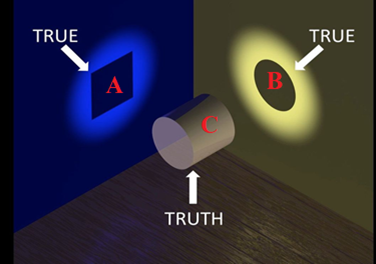Rohit Dhankar
[This is a personal response to a particular person. May not be of public interest. Posting on blog because tweeter can not handle detailed response like this.]
I am inclined to do a little commonplace analysis in this write-up. Nothing profound or great. The only reason I am indulging in it is that this kind of conversations are too common on social media and there are some very common fallacies in such thinking. Since these fallacies are very common, they merit some discussion even if at a common sense, and intellectually not really of great importance.
This analysis is on a small twitter exchange between me and an acquaintance. Since the conversation is already in the public space, I am taking liberty of quoting in full here and then analyzing without asking for permission of the other participant. I have left the spelling mistakes in tweets as they are, without editing. Parts of tweets I am using will be given in quotation marks “”, and text written now without quotation marks. The letter numbering [a], [b], etc. is done for the sake of analysis and was not part of the original tweets. In spite of my involvement in this conversation, the real objective here is to see the character of conversation and the kind of arguments used, not any kind of explanation.
Rohit: [a] “If @zoo_bear is you icon of free speach, you do not know what free speach happens to be. Period.”
[a1]: Here I am stating that Zubair can not be an icon of free speech. My reason would have been obvious to any one who have been reading my tweets. The objection is not to Zubair’s tweets which some people considered insulting to Hindu gods. Actually I supported that part as his right to free speech. My reason was that Zubair himself used tweets to ridicule Hindus and their gods, but when Nupur did the same he campaigned internationally to draw attention to supposed to be insult to Muhammad. This shows his double standards, therefore, any one who considers him an icon of free speech does not understand that free speech votaries have to give this right to all. They can not themselves enjoy this right and object to others having the same right.
[a2] Also it is useful to note that here my comment is directed to a group which campaigned for Zubair, not to any individual. This distinction matters in free speech as well as in civilized conversation.
zafar: [b] “U supported Nupur’s speech in ur tweets. If u think that was free speechthen u also don’t know what free speech is.”
[b1]: Here Zafar is claiming that if I supports Nupur then I do not know free speech.
[b2]: Also note that here he is directly attacking me as an individual. Compare it with [a2] above.
Rohit: “Yes, I supported Nupur and what she said. I also supported Zuber’s tweets. Can you tell me why I dont understand what free speech is? More directly: [c] why supporting Nupur shows lack of understanding of free Speech?”
[c]: The question here is: why supporting Nupur shows lack of understanding or knowledge of free speech? (The further analysis is keeping this question in mind.)
Zafar: 1. [d] “In ur tweets u were critical abt zubair u even wrote that icon wala tweet”
[d]: That is true. I was critical of Zubair but because of his double standards and not for his tweets.
Zafar: [e] “but on Nupur u were more soft snd even u retweeted a tweet mentioning she said truth.”
[e]: I wrote an article on this. I felt no need to be critical of Nupur on the issue of free speech, as I don’t consider her to be in the wrong. Also, I proved with references that what she said was true according to Islamic scriptures. And I supported Nupur’s right to free speech as a citizen, did not consider her any kind of paragon of free speech as the so-called liberals made out of Zubair.
Zafar: “Yes in ur article u wrote for both on similar points 👍”
Zafar: [f] “Free speech is also not absolute. In our constitution there is space for control if it conflicts with others’ liberty or [g] if it can create troubles in the country. [h] Practicing Faith is also free & [i] “her way of speaking so called truth against prophet was not in a normal conversation’s tone.”
There are three points here I will take them one by one:
[f]: Yes, free speech is not absolute. But (i) what Nupur said did in no way interfered with any one’s liberty. (ii) Interference with liberty with “speech” I found no where in the legal provisions. However, while thinking about free speech I do not accept article 295A which came after the Rangila Rasool controversy. I know that is legal provision and I can be punished for violating it. But in my thinking I consider Satanic Verses, Aubrey Menen’s Ramayana, Rangila Rasool, Charlie Hebdo cartoons, Danish cartoons, many pictures about Durga, Sita, Rama, Mahishasur, etc. within free speech. However, this can not be used to charge that I do not understand free speech. It only shows that my limits are wider than accepted in India. It involves to bias, contradiction and double standards. In this particular case I don’t even think that Nupur can be punished even under 295A. Because she referred to what is written and is often repeated by Islamic scholars themselves. I think this is pure pretension on the part of some Muslims. And I find it very difficult to understand how educated intelligent people can hide behind saying it aggressively or in national debate. I myself find Muhammad’s story of riding a horse like animal to heaven unbelievables.
[g]: “if it can create troubles in the country”: This is very spacious ground. The recent events (killing of at the least two people) prove this. Even saying that “I support Nupur” can be seen as creating trouble, as two people are already killed for this. And it continues. This can be used by bigoted people to subdue and silence citizens. I find it bizarre that people who shout about civil liberties from roof tops justify pretended outrage on such issues.
[h] “Practicing Faith is also free”. Sure, but Nupur’s statements did not interfere with any one’s practicing his/her faith. Actually, this is an example of trying to control others in the name of one’s faith. If I consider Rama as maryada-puroshottam that is my thinking. How can I stop you from saying that Rama killed Shambuk? If you consider Muhammad as an example of great human being, how can you stop me from saying that he married a six year old girl?
[i] “her way of speaking so called truth against prophet was not in a normal conversation’s tone.”
True. It was not. But she is not obliged to respect Muhammad because Muslims do. What she said was not “so called truth”, it is written in Quran and Bukhari, it is true enough. If she said it in an attacking manner, which she did, it can be considered rude and uncivilized. But not violation of any law. Also, Rahmani was doing the same in a more sophisticated manner. Though the ‘paragon of free speech’ Zubair edited that out in his propaganda.
Zafar: [k] “Its like if someone taunts someone about reality of his/her mother & father in a ridiculous way then it can offense someone. Faith is like that.”
[k]: This one is important and most common fallacy. First, lets try to understand the difference between a private citizen (someone’s father) and a public figure (Muhammad). One, a private citizen’s views and acts have limited impact on people’s lives, only on those who come in direct contact with him. Two, in case of a private citizen we are either in face to face contact or may come in direct contact. Thus, a private citizen can not be publicly criticized, and can not be insulted. One has to be civilized with him/her. A public figure, say Muhammad or Ram, is used to preach certain kinds of behaviors at a mass scale. Therefore, their acts, examples, and views will effect every citizen’s life. That gives every citizen a right to criticize, ridicule, make fun of and even insult them. This comparison of one’s parents and religious figures stems out of fallacious thinking. It is too common, at least educated and intelligent people should not use it. It does not matter if someone considers Rama or Muhammad more dear than their parents. The issue if not the devotee’s feelings. This issue is impact of their preachings on others’ lives.
Also, if X goes to Y uninvited and says “My father is such a great man.” Then Y immediately gets the right to quote X’s father’s misdeeds if there are any. The people who do not like Muhammad criticized should not praise him publicly, should not give examples of his behavior publicly, should not say that Quran (created by Muhammad) is given by Allah and is eternally true. If these claims are made publicly they will be criticized publicly. Same goes with Rama and Krishna, and Veda and Ramayana and so on.
Zafar: “Bt i believe that her way was right or wrong that should b decided by court.”
Zafar: [l] “But we clearly know that in zubair’s case police was proactive to take action so both cases r not on same platform.”
[I]: Irrelevant. My tweet was not about biases or favoritism of the government. It was only about Zubair being a bad example for champion of free speech. It could be easily proved that (i) he is biased, (ii) uses double standards, and (iii) even have spread fake news.
Conclusion:
(i) The direct attack early in the tweets is uncivilized.
(ii) The charge of not knowing free speech is unsubstantiated.
(iii) The support advanced to charge in (ii) does not stand.
People who want to use social media for democratic discourse should follow better standards of conversation.
*****
26th July 2022



 Posted by rdhankar
Posted by rdhankar 



